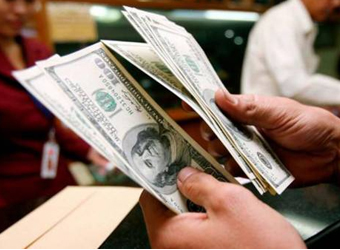Dollar prices fell to a three-year low against its peers on Wednesday, losing its earlier bounce as the euro edged back after shaking off a setback to Chancellor Angela Merkel’s chances of forging a “grand coalition” in Germany.
The dollar index against a basket of six major currencies last stood little changed at 90.446 after hitting 90.113, its lowest since December 2014.
The dollar index momentarily recovered to as high as 90.826 on Tuesday after slipping steadily this month on investors’ expectations that major central banks would eventually windback stimulus to normalize monetary policy.
“The view held by many market participants is that monetary policies are headed for normalization across the globe. The dollar is bound to stay weak when such views prevail,” said Yukio Ishizuki, senior currency strategist at Daiwa Securities in Tokyo.
The euro was 0.05 percent higher at $1.2266, brushing off weakness seen overnight and going as high as $1.2323 earlier, its strongest since December 2014.
The common currency had slid to $1.2195 on Tuesday after news which suggested the ECB might not tweak its policy message very soon curtailed the currency’s rally.
The euro had also been held back on Tuesday as members of the center-left Social Democrats (SPD) in one of Germany’s regions voted against talks with Merkel’s conservative Christian Democrats (CDU), stoking worries over whether she can form a “grand coalition”.
The dollar was 0.2 percent higher at 110.675 yen, inching back towards a high of 110.985 marked on Tuesday. It stooped to a four-month low of 110.245 on Monday amid speculation that the BOJ could eventually begin looking for a way out of its super accommodative policy.
The pound went as high as $1.3836, its strongest since June 2016.
It last stood little changed on the day at $1.3792.
The Canadian dollar was a shade weaker at C$1.2442 per dollar with immediate focus on the Bank of Canada’s monetary policy decision due later in the day.
The BoC is widely expected to raise interest rates by 25 basis points and take the benchmark borrowing cost to 1.25 percent. Analyst expect the BoC to raise rates as many as three times in 2018.
The Australian dollar rose 0.1 percent to $0.7970 and the New Zealand dollar dipped 0.1 percent to $0.7260.
Bitcoin was 7.2 percent lower at $10,570.00 on the Bitstamp exchange. It had lost 16 percent on Tuesday, during which it fell to a 1-1/2 month low of $10,162.00 after reports suggested it was still possible that South Korea could ban trading in bitcoin. Source: Reuters
Source: Reuters
